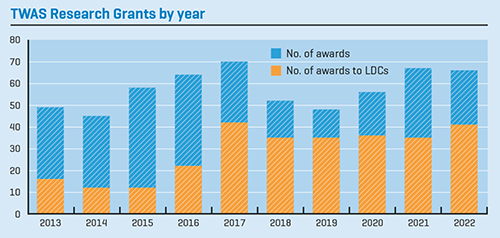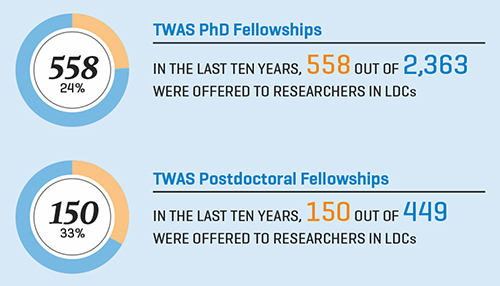For 40 years, The World Academy of Sciences for the advancement of science in developing countries—or TWAS—has been a leading force in developing crucial scientific capability in some of the most underdeveloped countries in the world.

A global science academy founded in 1983 in Trieste, Italy, TWAS supports sustainable prosperity through research, education, policy, and diplomacy. With its partners, it has graduated over 1,000 PhDs and offered hundreds of postdoctoral fellowships to developing world scientists. The Academy also hosts prestigious scientific awards in the global South, has offered numerous research grants, and supports exchange visits for scientists.
TWAS is a programme unit of UNESCO, and several of its programmes target LDCs. To stay up to date about the Academy's activities, follow TWAS on Facebook, LinkedIn, Twitter and YouTube, and subscribe to the bi-monthly e-bulletin TWAS Plus.
The Doha Programme Of Action and TWAS
Since developing the scientific capacity of LDCs is a key priority for TWAS, the Academy will be present at the 5th United Nations Conference on Least Developed Countries (LDC5), in Doha, Qatar from 5 to 9 March 2023.
The key text expressing the goals of LDC5 is the Doha Programme of Action for the Least Developed Countries for the Decade 2022-2031 (DPoA), endorsed by the UN General Assembly on 1 April. At LDC5, world leaders will gather with civil society, the private sector, young people and more to build the plans and partnerships to deliver on the promise and ambition of the DPoA over the following decade.
The DPoA includes six key focus areas, and the programmes of TWAS focus especially on ‘Leveraging the power of science, technology, and innovation to fight against multidimensional vulnerabilities and to achieve the SDGs’.
Several TWAS programmes target LDCs
- TWAS-SISSA-Lincei Research Cooperation Visits Programme: Young scientists from least developed countries who hold an a master’s-level degree or higher can visit research laboratories at Centres of Excellence in Trieste, Italy, for three months to carry out collaborative research projects related to the UN Sustainable Development Goals (SDGs). So far, 30 scientists from LDCs have been awarded this opportunity.
- TWAS-Sida PhD Fellowships on Climate Research for Students from LDCs: This programme was established to respond to the need for a broader base of expertise in climate research in Least Developed Countries by providing modern and complete PhD training. Under this programme, TWAS has built a portfolio of host supervisors including high-level climate experts. PhD scholarships can be awarded to promising candidates from LDCs who have obtained their master’s degree by December 2022, in an area relevant to the topic of climate change. The programme attracted 456 applicants from LDCs, and the selection process is currently ongoing.
- TWAS Research Professors in LDCs: The objective of this programme is to provide institutions and research groups in LDCs with the opportunity to establish long-term links with TWAS members and TWAS Young Affiliates and Alumni. TWAS scientists assist LDCs in research activities and advanced training, helping to develop the local scientific capacities needed. In the last 10 years, this programme awarded 4 researchers from LDCs.
- ProgrAmme of CollaboraTions with LDCs (PACTs): This programme, launched in 2021, is the result of a collaboration with the UN Technology Bank for Least Developed Countries and the International Centre for Genetic Engineering and Biotechnology (ICGEB). Through this initiative, early-career LDC scientists can make visitations to ICGEB labs in Italy, India and South Africa for up to six months. Thus far, TWAS has awarded 12 scientists from LDCs with PACTs visitations.
Most TWAS programmes and activities have a strong LDCs component
 TWAS-Sida Research Grants: With key support from the The Swedish International Development Cooperation Agency (Sida), the Academy has administered a long-standing TWAS Research Grants Programme for scientists in the global South, many of them in LDCs. In the last decade, TWAS awarded 164 grants to individual scientists in LDCs, and 100 grants to research groups in LDCs for research grants in basic sciences.
TWAS-Sida Research Grants: With key support from the The Swedish International Development Cooperation Agency (Sida), the Academy has administered a long-standing TWAS Research Grants Programme for scientists in the global South, many of them in LDCs. In the last decade, TWAS awarded 164 grants to individual scientists in LDCs, and 100 grants to research groups in LDCs for research grants in basic sciences.- Seed Grant to New African Principal Investigators: The programme, funded by the German Federal Ministry of Education and Research (BMBF), aims to support young scientists from Africa who are getting established in their country or are about to return home to an academic position. Grants are awarded to promising high-level research projects in agriculture, biology, chemistry, Earth sciences, engineering, information computer technology, mathematics, medical sciences and physics carried out in African countries lagging in science and technology identified by TWAS. Since its launch in 2021, the programme awarded 24 scientists from LDCs.
 TWAS PhD and Postdoctoral Fellowships supported by Programme Partners in Emerging Economies: For developing countries, and especially LDCs, PhD scientists help build a foundation for scientific strength and human prosperity. Likewise, postdoctoral fellowships offer scientists the chance to gain invaluable experience working with prominent colleagues in other developing countries. In the last 10 years, TWAS awarded 470 PhD Fellowships and 118 Postdoctoral Fellowships to researchers from LDCs.
TWAS PhD and Postdoctoral Fellowships supported by Programme Partners in Emerging Economies: For developing countries, and especially LDCs, PhD scientists help build a foundation for scientific strength and human prosperity. Likewise, postdoctoral fellowships offer scientists the chance to gain invaluable experience working with prominent colleagues in other developing countries. In the last 10 years, TWAS awarded 470 PhD Fellowships and 118 Postdoctoral Fellowships to researchers from LDCs.- TWAS Young Affiliates Programmes: Fostering the next generation of scientists in the developing world is one of the strategic priorities of TWAS. The Academy launched the ‘TWAS Young Affiliates’ programme to recognize the most accomplished young scientists in various regions of the developing world. Each year, TWAS, in collaboration with five TWAS Regional Offices, select up to 25 outstanding young scientists under the age of 40 as TWAS Young Affiliates, for a period of five years. After five years, they become Alumni. Over the past decade, TWAS selected 48 Young Affiliates from LDCs.
- Science diplomacy: In collaboration with the American Association for the Advancement of Science (AAAS), TWAS is leading a programme that includes lectures, workshops, courses and prizes to build a bridge between the worlds of science and diplomacy. 27 attendees of 2022 TWAS science diplomacy trainings were from LDCs.
The strong network of TWAS
TWAS is based in Trieste, Italy, on the campus of the Abdus Salam International Centre for Theoretical Physics (ICTP). The Academy hosts and works in association with two organizations, also hosted on the ICTP campus: the Organization for Women in Science for the Developing World (OWSD) and the InterAcademy Partnership (IAP).
The Organization for Women in Science for the Developing World (OWSD) promotes the role of women in the development process and supports their representation in scientific and technological leadership. With more than 9,000 members in 107 countries and 51 National Chapters throughout the developing world of which 20 are LDCs. OWSD provides research training, career development and networking opportunities for women scientists, many of them from LDCs.
Under the umbrella of the InterAcademy Partnership (IAP), some 150 national, regional and global member academies (14 of which are in LDCs) work together to support the vital role of science in seeking evidence-based solutions to the world’s most challenging problems. Individually and especially by working together in the IAP network, academies can advance sound policies, improve public health, promote excellence in science education, and achieve other critical development goals.
From the founding of TWAS to the present day, Italy has provided essential encouragement and support to the Academy. Working closely with the Italian Government, TWAS conducts events on international research cooperation and science diplomacy, and on other projects of mutual interest. TWAS has also an enduring relationship with major Italian scientific organizations and universities.
Actively engaged in its headquarters city of Trieste, Italy, TWAS is part of the 'Trieste System' of scientific organizations, and the Sistema Scientifico e dell'Innovazione del Friuli Venezia Giulia (SiS FVG).
For a broad overview on the work TWAS does for LDCs, see this full-size poster that the Academy prepared for LDC5.

